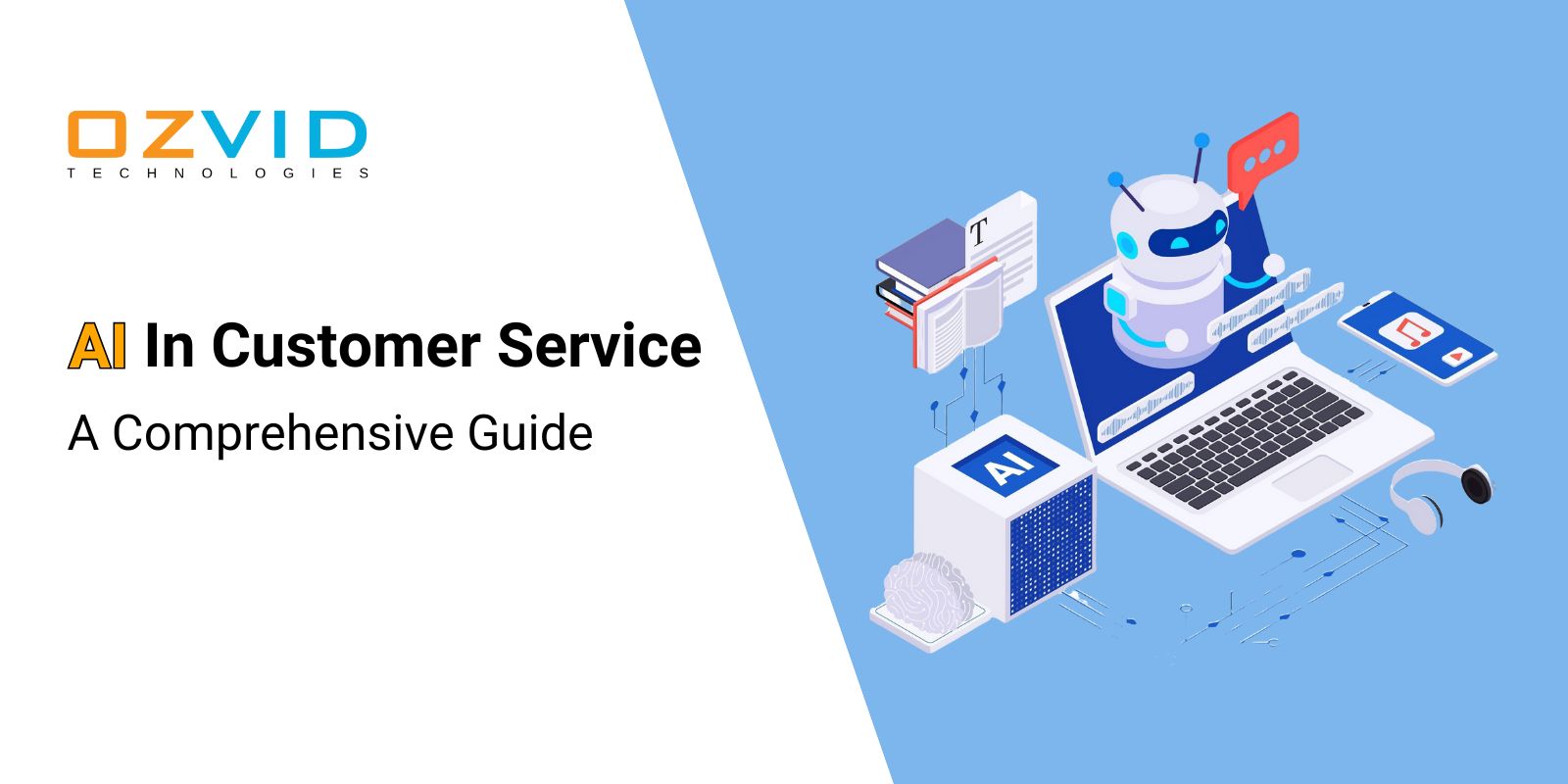- Jan 14, 2026
Share this post on:

According to research, AI in the customer service market is expected to reach $2.8 million by 2032, growing at a CAGR of 25.11%.
Generative AI, a branch of artificial intelligence solutions, is now making its mark across nearly every industry. The advancements in AI have led to the development of advanced algorithms that enhance operations business operations. The analytics produced can take various forms, including written content, images, text, or audio.
Generative AI is evolving to manage complex, personalized interactions and inquiries. Its applications in this field are diverse, ranging from providing quick information to clients and facilitating genuine conversations to creating conversation flows that help overcome writer's block and inspire creativity by offering response templates for authors.
In June 2023, CNBC reported that Amazon plans to invest $100 millionin a center dedicated to helping companies leverage generative AI. Alongside this investment, Amazon will recruit new data scientists and engineers for the facility. The company has clarified that this will not be a primary facility but an application focused on generative AI.
Key Takeaways:
- AI in customer service is growing rapidly, expected to reach $2.8 million by 2032.
- AI improves efficiency, reduces costs, and enhances customer satisfaction.
- Benefits include 24/7 support, automation, personalized experiences, and cost savings.
- Future trends include predictive capabilities, enhanced chatbots, and deeper AI-human collaboration.
AI in Customer Service: Benefits
Artificial Intelligence (AI) transforms customer service by enhancing efficiency, reducing costs, and improving customer satisfaction. Here are the key benefits:
1. 24/7 Customer Service: AI enables businesses to offer round-the-clock support, ensuring that customers can receive assistance at any time. This constant availability meets the modern demand for immediate responses, thereby enhancing customer satisfaction and loyalty. AI chatbots can handle inquiries and provide instant responses outside regular business hours, significantly reducing wait times and preventing missed opportunities.
2. Time-saving: AI automates routine tasks such as answering frequently asked questions and processing simple requests. This automation allows customer service agents to focus on more complex issues, thus optimizing their time and increasing overall operational efficiency. For instance, AI can quickly route customer inquiries to the appropriate department, streamlining workflows and reducing response times.
3. Data Usage: AI systems leverage vast amounts of customer data to provide personalized experiences. By analyzing past interactions and preferences, AI can tailor responses to individual customers, enhancing engagement and satisfaction. This data-driven approach not only improves service quality but also helps businesses identify trends and areas for improvement in their offerings.
4. Cost-effective: Implementing AI in customer service can lead to significant cost savings. By automating routine inquiries and reducing the need for a large support team, businesses can lower labor costs while maintaining high service levels. For example, companies using AI chatbots have reported reductions in support costs by as much as 20% due to decreased reliance on human agents for basic queries.
5. Increased Productivity: AI enhances productivity by allowing human agents to concentrate on high-value tasks that require critical thinking and empathy. With AI handling repetitive inquiries, agents can resolve more complex issues more efficiently. This not only improves job satisfaction for employees but also leads to faster resolution times for customers.
6. Personalized Experiences: AI facilitates personalized customer interactions by utilizing insights from previous interactions and preferences. This capability allows businesses to offer tailored recommendations and solutions, making customers feel valued and understood. Personalized experiences can significantly boost customer loyalty and retention rates.
AI in Customer Service: Applications
AI is revolutionizing customer service across various applications, enhancing efficiency and customer satisfaction. Here are the key applications of AI in this domain:
1. Self-Service Options: AI-powered self-service solutions enable customers to resolve issues independently through intuitive interfaces. These systems often include FAQs, knowledge bases, and guided troubleshooting, allowing users to find answers without waiting for human assistance. This not only reduces operational costs but also empowers customers to take control of their service experience.
2. Sentiment Analysis: AI-driven sentiment analysis tools assess customer feedback from various sources, such as social media, reviews, and surveys. By categorizing sentiments as positive, negative, or neutral, businesses can gain insights into customer feelings and perceptions. This information helps in prioritizing support tickets based on emotional tone, allowing teams to respond with empathy and urgency when needed.
3. Chatbots: Chatbots are increasingly sophisticated AI tools that handle a wide range of customer inquiries. They can provide instant responses to common questions, assist with transactions, and even escalate complex issues to human agents when necessary. The use of natural language processing (NLP) allows chatbots to engage in more human-like conversations, improving the overall customer experience.
4. Customized Support: AI enables highly personalized customer interactions by analyzing data from previous interactions and preferences. This allows businesses to tailor their support strategies to individual needs, providing recommendations and solutions that resonate with specific customers. Such customization fosters deeper connections and enhances customer loyalty.
5. Voice Analysis: AI systems equipped with voice recognition technology can analyze the tone and emotion in a customer's voice during calls. This capability allows businesses to identify frustration or satisfaction levels in real-time, enabling them to adjust their responses accordingly. For instance, if a customer sounds upset, the system can prioritize their call for immediate attention.
6. Augmented Messaging: Augmented messaging combines AI with messaging platforms to create interactive experiences for customers. This includes features like automated follow-ups based on customer interactions or reminders for upcoming appointments. Such enhancements streamline communication and ensure customers feel valued and engaged throughout their journey.
7. Multilingual Support: AI facilitates multilingual support by automatically translating conversations in real time. This feature breaks down language barriers, allowing businesses to serve a global audience without needing extensive multilingual staff. It enhances accessibility and ensures that all customers receive consistent service regardless of their language preferences.
AI in Customer Service: Future
Ever wonder what’s next? What is the future of AI in customer services? The future of AI in customer service is ready for significant transformation, driven by advancements in technology and changing customer expectations. Here are the key trends shaping this evolution:
1. Enhanced Personalization: AI will increasingly focus on personalized customer experiences. By leveraging data from past interactions, AI can tailor services to individual needs, offering personalized recommendations and support. This level of customization is becoming essential, as surveys indicate that a substantial portion of customers (50%) desire more personalized messages and experiences.
2. Predictive Capabilities: AI's ability to predict customer needs is improving. By analyzing historical data, AI can anticipate issues before they arise, enabling proactive support. This predictive approach not only enhances customer satisfaction but also helps businesses retain customers by addressing potential problems early.
3. Increased Chatbot Adoption: Chatbots are expected to play a pivotal role in customer service, with advancements in natural language processing leading to more human-like interactions. These AI-driven tools will handle a larger volume of inquiries, providing instant responses and reducing wait times.
4. Integration with Emerging Technologies: The future will see AI integrated with other technologies such as augmented reality (AR) and virtual reality (VR), creating immersive customer service experiences. This integration will allow customers to visualize products or receive interactive troubleshooting assistance.
5. Self-Service Options: AI will enhance self-service capabilities, empowering customers to find solutions independently through intuitive interfaces. This trend aligns with the increasing preference for self-service among consumers, as it allows them to resolve issues without waiting for human intervention.
6. Improved Analytics: AI will advance customer service analytics, enabling organizations to better understand consumer behavior and preferences. This insight allows businesses to refine their strategies and improve overall service quality.
7. Human-AI Collaboration: While AI will automate many tasks, the human touch will remain crucial in customer service. AI is designed to assist human agents rather than replace them, allowing for a more efficient and empathetic approach to customer interactions.
The Bottom Line
If you are looking to enhance your customer retention and loyalty, choose AI-based customer services. In addition to chatbots and self-service platforms, AI-driven automation is transforming the consumer experience by customizing product offerings to meet individual needs. Furthermore, AI can help businesses optimize their workflows and reduce repetitive daily tasks.
If you are looking to integrate AI into your existing system, look no further than OZVID Technologies. We have a team of dedicated AI developers who are well-versed with the latest algorithms and ensure to apply algorithms as per business requirements. Get in touch today and leverage our expertise.
FAQ's
1. What is AI in customer service?
AI in customer service refers to the use of artificial intelligence technologies, such as chatbots, virtual assistants, and machine learning, to enhance customer experiences. These AI tools help businesses automate responses, solve customer issues, and provide personalized support more efficiently than traditional methods.
2. How does AI improve customer service?
AI improves customer service by enabling faster response times, 24/7 availability, and personalized interactions. AI can handle routine queries, freeing up human agents for more complex issues. It also learns from customer interactions, improving over time to provide more accurate answers, thus enhancing the overall customer experience.
3. Can AI completely replace human customer service agents?
While AI can automate many customer service tasks, it is unlikely to fully replace human agents. AI excels at handling simple, repetitive tasks and providing quick solutions, but human agents are still essential for resolving complex or emotional customer issues. AI works best when combined with human support for a balanced approach.
4. What are the benefits of using AI in customer service for businesses?
The key benefits of AI in customer service for businesses include cost savings, increased efficiency, and improved customer satisfaction. AI reduces the need for human intervention in routine tasks, allowing companies to scale their operations. It also provides customers with instant support, enhancing their experience and boosting brand loyalty.










